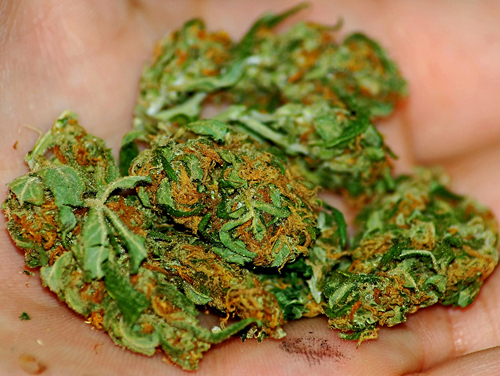Should marijuana be legal? This November, Oregonians will decide.
Supporters of Measure 80—an amendment to the state constitution that will legalize cannabis—have collected the necessary 87,000 signatures to put the issue on the ballot this fall.

Unlike past efforts in Oregon that sought to expand access to medical marijuana, Measure 80, also known as the Oregon Cannabis Tax Act, is presented as a plan for full legalization and taxation by the state.
In theory, cannabis growers would be licensed by the state to sell their product through state-sanctioned dispensaries, much like liquor. Also like liquor, all legal commerce would be controlled by an Oregon Cannabis Commission and could not be purchased by anyone under 21.
The measure’s supporters and opponents are preparing for battle.
Paul Stanford, founder of The Hemp and Cannabis Foundation, wrote the measure and serves as chief petitioner. He described the bold call for full legalization as an upfront approach that addresses past concerns about “backdoor legalization.”
The term became associated with past medical marijuana efforts such as Measure 74 in 2010 and Washington’s Initiative 502, which would have legalized small amounts of marijuana.
“Ours is a more comprehensive bill,” Stanford said.
Stanford, who began research on cannabis legalization in 1988 while studying business administration at Portland State, has been an advocate of cannabis for years. Also, as owner of several medical marijuana dispensaries, he is among cultivators and dispensers who stand to benefit from legalization.
Stanford called upon sources ranging from papers written by America’s founding fathers to the Bible’s Book of Genesis and scientific studies to back up claims on the economic, dietary and biodynamic value of cannabis in the form of industrial hemp.
Stanford argued that cannabis has been cultivated around the world for thousands of years for its attributes as a fiber, food and oil. Based on studies conducted by the University of Illinois and the University of Notre Dame, the seeds from one acre of feral hemp have the potential to produce 300 gallons of biodiesel.
“This will put Oregon on the cutting edge of exciting new economic development in fuel, fiber, food and medicine industries and put Oregon at the center of it…If we can get that message out, we will win,” he added.
The Oregon Cannabis Tax Act campaign has begun heavy advertising, focusing on the benefits of industrial hemp and public safety through regulation. The campaign estimates that Oregon would raise $140 million annually in tax revenue.
“This is going to enhance public safety. If a policeman is busy with a marijuana bust, he can’t arrest a rapist or murderer,” Stanford said.
However, opponents say many of Measure 80’s claims are unfounded.
Clatsop County District Attorney Joshua Marquis, who has written extensively on drug laws, is one of Oregon’s most vocal opponents of legalization. He argues that though marijuana is less dangerous than alcohol, introducing another intoxicant into society would not be a good idea.
Marquis also pointed out that prosecution of marijuana users in Oregon is minimal, and that since 1973 possession of less than an ounce has only counted as an infraction. Marquis claimed that there are 14,000 Oregonians incarcerated on drug charges, none of which are solely for marijuana.
“The only time we go after marijuana is when we trip over it,” Marquis said. “It’s just not a high priority.”
Marquis argued that legalization would not make law enforcement easier, since police cannot test for recent marijuana intoxication as they can for alcohol. Regulation would also be harder than for alcohol since cannabis is an abundant and adaptable plant that can grow nearly anywhere.
Although he is against legalization, Marquis said the way the federal government treats cannabis is problematic. He criticized the Bush administration for declaring methamphetamine has limited medical use, while maintaining that cannabis had none and could not be prescribed by a doctor.
“I’m not some right-wing ‘marijuana is the devil’ kind of person,” Marquis said, insisting that cannabis should be legal if prescribed by a doctor, but that the medical marijuana system is abused under current law in Oregon.
“Obviously it has a legitimate medical use. Now, it does not have a legitimate medical use for 70,000 Oregonians. That’s bullshit.”
Regardless of the pros and cons of legalization, the political forecast for making it a reality is not optimistic. Professor Christopher Shortell, who teaches political science in PSU’s Hatfield School of Government, weighed in on Measure 80’s future.
“My sense is that in all likelihood this is probably going to result in a similar outcome as previous attempts. Public opinion on the issue of marijuana legalization has been shifting, but it’s not shifting dramatically—certainly not to the point that I would expect something like this to pass,” Shortell said.
Shortell explained that in the event that Oregon did legalize cannabis, the federal government has been explicit about using the Controlled Substances Act to override state rights, as it has to justify using federal agents to bust medical marijuana dispensaries in California.
However, in 2008, the Supreme Court did uphold an Oregon law allowing doctors to prescribe pentobarbital in cases of assisted suicide when the federal government attempted to revoke it under the Controlled Substances Act.
Cannabis advocates hope that as a tax by the state, the Supreme Court may overrule the federal government on similar grounds for cannabis.
Measure 80 was written specifically to stand up in federal court with attention to the rules of the Controlled Substances Act, according to Stanford. The campaign will be ramping up through the summer leading up to the elections in November.

